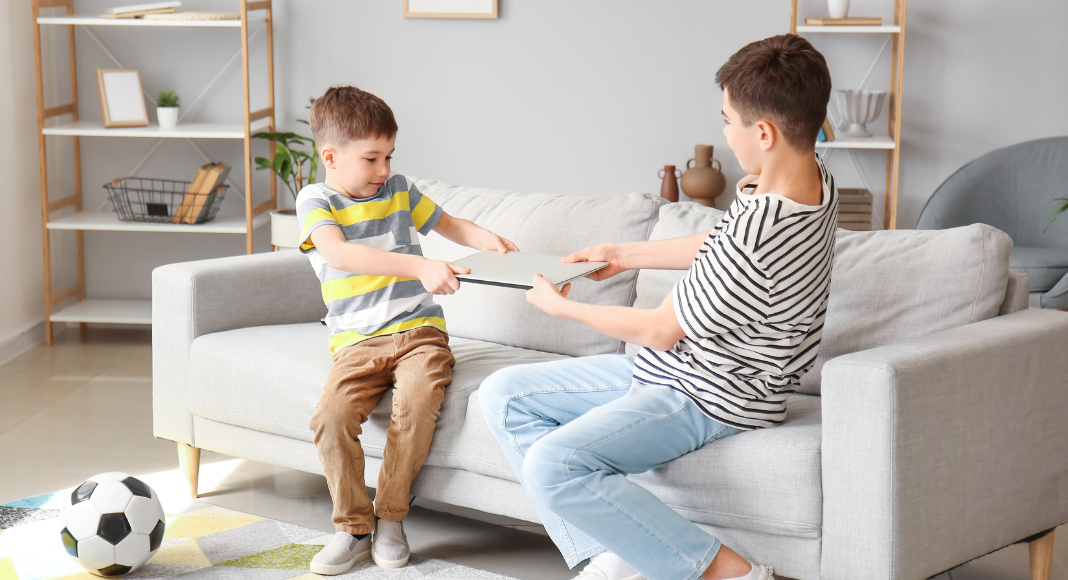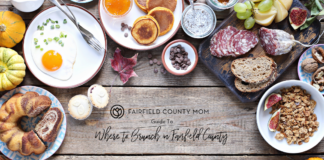 “I’m not coming down. I do not want to ever see you or anybody in this house again,” my seven-year-old son exclaimed as I left his room.
“I’m not coming down. I do not want to ever see you or anybody in this house again,” my seven-year-old son exclaimed as I left his room.
I am a mom of two boys, so bold statements like this do not phase me, but this one was different. Even though I knew he did not mean it, my heart ached as I looked into his bright, blue eyes. We just had our first real, almost adult-like conversation. I knew his statement resulted from his naive mind processing everything we discussed.
It was not an easy conversation for me either. Five minutes after he was sent to his room, my husband and I looked at each other before I mouthed, “I’ll go.” As I walked up the stairs, I thought, “How am I going to approach this one?”
He had not done anything outwardly malicious, but we needed to have a conversation. A tough conversation. It was tempting to avoid it, but I am his parent. If I shy away from these conversations – what service am I doing him? What service am I doing society? So I climbed the ladder to his bunk bed and started talking to the body-shaped lump under his blanket.
“Do you know why Dad and I sent you up here?” This was not a rhetorical question. Even I was having trouble harnessing my thoughts into a cohesive message. My seven-year-old certainly had the right to be confused. Two and a half years ago, our entire family’s world was turned upside down when his younger brother (who was just two at the time) was diagnosed with a brain tumor.
A bright and vibrant toddler suddenly required emergency brain surgery, and a different child came out the other side. A child who did not look the same, did not speak the same, and did not process things the same way as the brother he once knew. A child who had a gastrostomy tube protruding from his belly because he no longer felt thirst. A child whose left chest possessed a bulging square-shaped piece of flesh covering a port-a-cath to receive chemotherapy. A child who could no longer keep up with his big brother in any sense of the word.
We all had fought our way through the past two years to arrive at our family’s new “normal.” At the young age of four, my son, now hiding under his blanket, had gone from a designated rough housing partner to a pseudo-caregiver for his brother. He instinctively knew he could no longer play with his sibling the same way.
There was a shift. An undeniable change in their relationship. One that pulled on my heartstrings daily and became a painful part of our new reality. It added another layer of grief for me as a mother and amazement at how my eldest fell into the role.
He was a sensitive and deeply kind soul at just four years old. He understood that his brother was different. He took on a nurturing voice when speaking to him and a tender physical mannerism toward him. These gentle behaviors are a far cry from their pre-brain cancer relationship when he lost his first tooth at the hand of his little brother’s punch to the mouth.
His amazing kindness probably made the morning’s incident sting a little deeper. My cancer warrior was counting to twenty. At five, a task he had mastered at the age of 2.5 is now a challenging feat. “One, two, three, four, five, six, eleven, eighteen…”.
My elder son sat next to him on the couch and started innocently laughing. It was not a mean-spirited laugh but an easily discernible giggle that made my youngest stop cold and look at his brother with confusion. My insides churned as I recognized a sadness come across his little face. As the room got quiet, my older son looked up from his video game and realized what was happening. He did not push back when I sternly told him to go up to his room.
And now here we were. Parenting is difficult. Parenting a neurotypical child and his newly special needs brother is a whole new level of challenge.
Many memories have surfaced for me since my younger son’s special needs diagnosis. I was not a mean child, but I certainly wasn’t one to step in if I witnessed someone deemed “different” being teased. I would never be classified as a bully by my peers. I was considered sweet and kind.
I socialized with different groups. I never received a bad report. Yet, I was guilty. Guilty of being a kind bully. Blameworthy for not walking away if I was witness to cruelty. Responsible for maybe smirking or being too timid to tell the offender that their comments were inappropriate. In a way, I perpetuated the cycle. A cycle of people who may not fit the accepted “template” being treated poorly. What I formerly thought was innocent now nauseates me as I lay in bed at night.
One memory in particular that haunts me is from high school. I was a senior or junior walking down the special education hallway. The hall was empty besides a severely handicapped, nonverbal boy and me. He crossed to my side of the hall and approached me with his arms outstretched. I smiled and asked if he needed help, assuming he may be lost. Then, he hugged me. I hugged him back before walking him back to his class and continuing to lunch.
Nothing was spiteful in my actions, but once back at my lunch table, I remember re-telling the story, laughing with my friends, and speculating that maybe he was trying to kiss me. I remember imitating his outstretched arms and all of us cackling at his expense. Reliving this memory brings me to tears, especially when I see the joy my sweet baby boy receives from an innocent hug.
Not in so many words, I shared some of these memories with my elder son. His eyes were wide as his head peeked from his blanket, listening intently. The experience was relatable. I was not a bad person, but I was shy and self-conscious and did not want to stand up for someone being bullied for fear the wrath would turn toward me. For the incident in high school, I have no words. I was not a timid, insecure girl at that time. I should have known better. I apologize daily to that boys’ parents for using their sweet child as lunch table fodder.
That is the conversation. Many of our children will not be the big, bad bullies depicted in movies. Many are sweet and innocent kids trying to get by during difficult transition years.
This analysis is from a grounded, mature parent’s perspective, and I am not naive enough to think that a generation can eliminate teasing or malicious behavior. In many ways, being on the receiving end of harassing behavior can build character. Parenting is a fine line between helping your child develop a thick skin and enough resilience to overcome all the difficult situations that undoubtedly arise in life and making sure they remain a good person.
Yet when I watch my sweet warrior try to join a conversation with peers, a feeling of dread erupts from my stomach. Will they ignore him? Will they roll their eyes? Will they even hear his soft voice, which has worked up so much courage to try and be part of the group? I do not have the answers on how to solve the problem of the kind bully.
When I left my son’s room, I did not give a verbatim list of things he needed to do differently. I gave him something to ponder. I shared the childhood mistakes that I wish I could undo now. I gave authenticity to someone who did not even know he was being teased – someone exactly like his brother.
I hope other parents have the same delicate conversations with their children. Not a precise list of solutions, but something to think about and an instinctive desire to do better.
 Molly is a registered nurse turned stay-at-home mom. She lives in Fairfield with her husband, three sons (2013, 2015, and 2021), and rescue pup. She has always had a passion for writing and feels compelled to pursue it now more than ever after her middle son was diagnosed with a brain tumor in 2018. Writing has become a form of therapy as she navigates her life as a cancer mom. She is determined to spread awareness and create much-needed change for all of the little warriors fighting this cruel set of diseases. She loves to travel and hopes her family will start going on more adventures as #teddystrong continues to kick cancer’s butt. In the meantime, she loves the Fairfield community, nights at the beach, drinking IPAs or wine, laughing too loud with her girlfriends, and being with her family.
Molly is a registered nurse turned stay-at-home mom. She lives in Fairfield with her husband, three sons (2013, 2015, and 2021), and rescue pup. She has always had a passion for writing and feels compelled to pursue it now more than ever after her middle son was diagnosed with a brain tumor in 2018. Writing has become a form of therapy as she navigates her life as a cancer mom. She is determined to spread awareness and create much-needed change for all of the little warriors fighting this cruel set of diseases. She loves to travel and hopes her family will start going on more adventures as #teddystrong continues to kick cancer’s butt. In the meantime, she loves the Fairfield community, nights at the beach, drinking IPAs or wine, laughing too loud with her girlfriends, and being with her family.

























